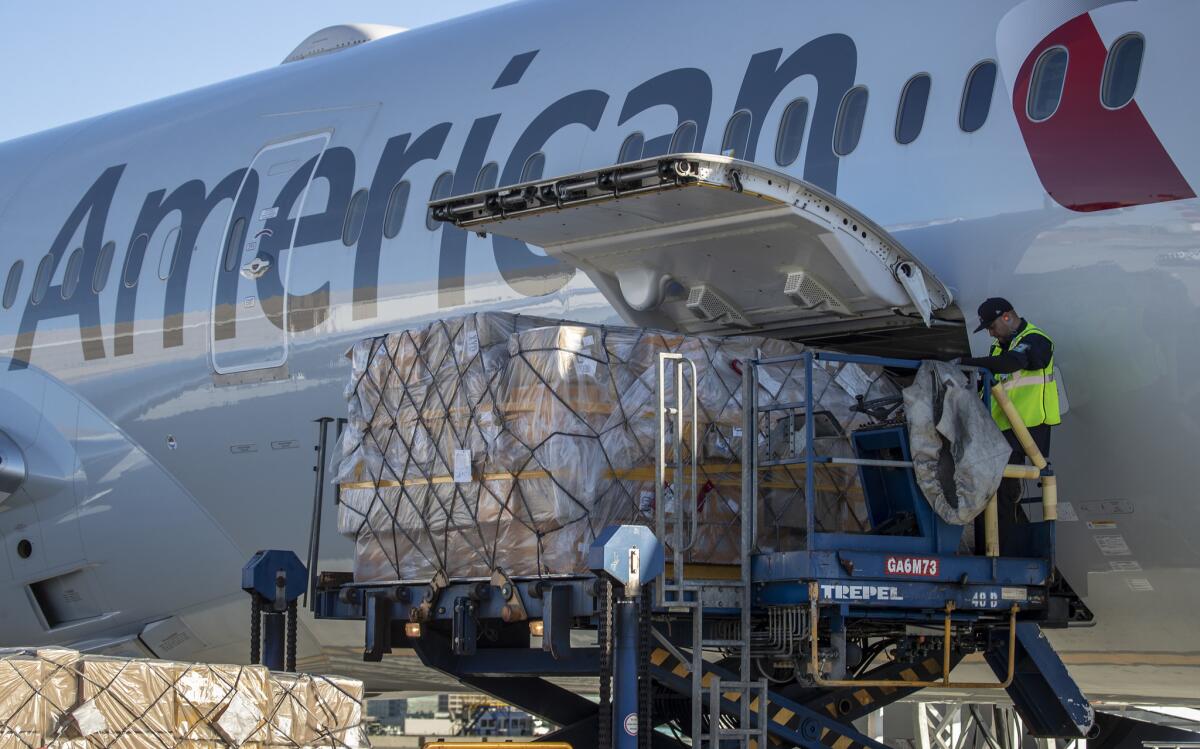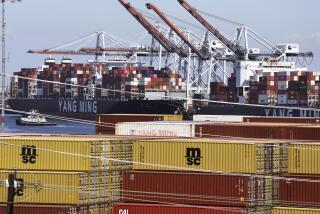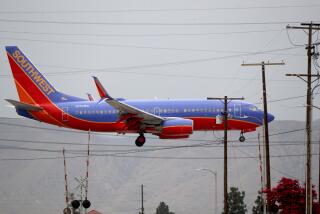Airlines pivot from passengers to cargo amid coronavirus crisis

The coronavirus outbreak has pushed the airline industry into strange territory. For American Airlines, that means — for the first time in 36 years — flying two cargo-only flights from the U.S. to Germany.
The two round-trip flights earlier this month of a Boeing 777-300 from Fort Worth to Frankfurt were a sign of desperate times for an industry that has seen passenger demand drop by up to 90% on some routes since the crisis began.
American Airlines, the world’s largest carrier, isn’t the only airline trying to find new revenue streams. Other major operators, including Delta and United, have launched new cargo-only service while dramatically cutting domestic and international passenger flights.
“Challenging times call for creative solutions, and a team of people across the airline has been working nonstop to arrange cargo-only flight options for our customers,” Rick Elieson, president of cargo for American Airlines, said in a statement.
Southwest Airlines, the nation’s largest low-cost carrier, announced Tuesday that it is offering cargo-only flights for the first time in the company’s nearly 50-year history, although the airline has yet to launch specific routes.
“We’re facing one of the most unprecedented times in our industry and it’s up to us to create new and innovative ways to continue serving our customers, including those who are moving cargo throughout the United States,” the Dallas-based carrier said in an online post Tuesday.
The cargo push isn’t limited to U.S. airlines. Scandinavian Airlines, known as SAS, and Abu Dhabi, United Arab Emirates-based Etihad Airways said they are expanding their cargo operations using passenger planes in response to the steep drop in air travel demand.
Since March 13, Korean Air has been flying A330-300 passenger planes with cargo only up to five times a week between locations in South Korea, Vietnam and China.
The addition of such cargo-only flights several times a week isn’t enough to make up for the devastating drop in passenger demand that has sent the industry reeling.
A recovery could take up to seven months, with passenger revenue dropping more than 40% and costing the world’s carriers $252 billion in losses in 2020, according to a forecast by the International Air Transport Assn., a trade group for the world’s airlines.
Still, converting some passenger flights to cargo only makes sense, especially because many airlines are continuing to pay the salaries of some of their pilots and fuel prices have dropped significantly in the past month, according to industry experts.
“They are trying to be creative and make the best of a bad situation,” said Seth Kaplan, an aviation analyst and host of an airline-themed podcast.
The $2.2-trillion coronavirus relief package signed into law last week requires that airlines that want to tap into more than $50 billion of it keep paying employees salaries and maintain service to all destinations served as of March 1 “to the extent reasonable and practicable,” according to the legislation.
But demand for air travel has dropped so dramatically that some airline executives are now considering appealing to the U.S. Department of Transportation to allow the carriers to consolidate their flights so that they aren’t required to fly planes carrying only a handful of passengers, according to a report by CNBC.
Hotel housekeepers have waged a fierce battle to restore automatic daily room cleaning that was scaled back at many properties during the pandemic.
Before the coronavirus outbreak, traditional U.S. airlines generated less than 5% of their overall revenue from transporting cargo in the belly of their planes. Most of an airlines’ revenue has come from air fares and charges for services such as checking luggage or providing food and drinks.
When passenger demand plummeted over the last month, airlines cut capacity up to 90% on international routes and more than 50% on domestic routes. That created a shortage of passenger planes carrying cargo in the hold.
On Monday, Delta Air Lines said it restarted regularly scheduled flights from China with cargo-only flights between Shanghai and Detroit, carrying 49 tons of medical supplies.
“Operating regularly scheduled cargo flights means suppliers in China can get these supplies to hospitals and healthcare facilities across the U.S. within hours, not the days or weeks it would take via cargo ship,” Shawn Cole, vice president of Delta cargo, said in a statement.
In the previous week, Delta flew several cargo-only flights, including a flight from Dublin, Ireland, to Atlanta, carrying more than 32,000 pounds of pharmaceutical supplies in a widebody Airbus A350. Delta also flew cargo-only flights between Chicago and Amsterdam and between Los Angeles and Sydney, Australia.
United Airlines said that it launched a minimum of 40 weekly cargo-only flights last week, including flights from Los Angeles International Airport to Hong Kong, London and Shanghai as well as flights from Chicago, Newark, N.J., and Houston to Amsterdam, London, Germany, Hong Kong and Shanghai. The planes carried freight and mail, among other cargo.
On Saturday, United flew a cargo-only B777-300 charter flight to transport nearly 100,000 pounds of food to U.S. troops in Guam.
“They are trying to make lemonade, as the saying goes,” Kaplan said of U.S. carriers.
More to Read
Inside the business of entertainment
The Wide Shot brings you news, analysis and insights on everything from streaming wars to production — and what it all means for the future.
You may occasionally receive promotional content from the Los Angeles Times.












